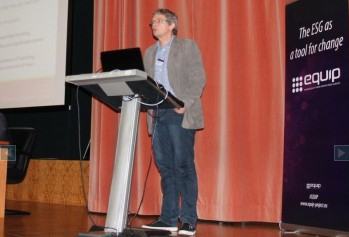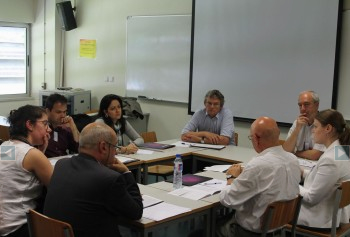Quality assurance of higher education well underway
The importance of student centred learning was emphasised by Education International to mark the completion of the first phase of activities of the Enhancing quality through innovative policy and practice project on 9 June.

The Chair of the Higher Education and Research Standing Committee of Education International / European Trade Union Committee on Education, Jens Vraa - Jensen, addressing participants to the EQUIP worksho
The Enhancing quality through innovative policy and practice (EQUIP) project aims to support higher education stakeholders in meeting the challenges arising from the introduction of the 2015 version of the Standards and guidelines for quality assurance in the European Higher Education Area (ESG).

It has offered stakeholders three workshops and two webinars on quality assurance of higher education. The five events took place over the past six months and brought together representatives from higher education institutions and quality assurance agencies, as well as students and voices from the labour market to explore the consequences of the introduction of the ESG 2015.
The events addressed:
· Changes in external quality assurance as a result of the ESG 2015
· The implications of the new focus on learning and teaching in the ESG 2015
· Student-centred learning (SCL)
· Admission, progression, recognition and certification in view of the ESG 2015
· New modes of delivery, including e-learning and dual education programmes
· The enhancement of programmes by connecting internal and external quality assurance
Nine principles
In his presentation at the EQUIP final training workshop on the ESG 2015 on 7 June, the Chair of the Higher Education and Research Standing Committee of Education International/European Trade Union Committee on Education, Jens Vraa-Jensen, highlighted the nine basic principles of SCL from the teachers’ perspective:
1. SCL requires an ongoing reflexive process.
2. SCL does not have a ‘one-size-fits-all’ solution.
3. Students have different learning styles.
4. Students have different needs and interests.
5. Choice is central to effective learning in SCL.
6. Students have different experiences and background knowledge.
7. Students should have control over their learning.
8. SCL is about ‘enabling’, not ‘telling’.
9. Learning needs cooperation between students and staff.
Stressing the implications of SCL, Vraa-Jensen noted that there should be no standardised tests or curricula, as well as no “one size fits all” approach to planning and study structure.
He insisted on respect for and protection of academic freedom – including the freedom to learn for the students – as well as necessary continuous professional development, and sufficient time given to teachers to prepare and evaluate classes.
He criticised the casualisation of employment in education, the deterioration in working conditions for many European teachers, and highlighted the difficulties in achieving achieve a work-life balance in current institutional contexts.
Conclusion
Vraa-Jensen concluded that:
· Successful higher education institutions in a period of austerity are inextricably linked to the creation of supportive academic work environments
· Permanent employment is a pre-condition for creating supportive work environments
· Academic staff need to be involved in meaningful decision making through collegial governance structures and their representative unions
· There is an urgent need for improving professional development for academic staff
· Autonomy in research remains the key factor explaining job satisfaction in otherwise difficult conditions
· Academics are not against accountability but the evaluation of teaching should be focused on improving teaching quality
· Unnecessary administrative burdens must be reduced and more administrative support is needed
· Goals and developments of the Bologna Process need to be better communicated towards the academic community
Next stage of EQUIP
The EQUIP project now moves on to the analysis and study of implementation challenges, good practices, and proposed approaches to solving these challenges. Several focus groups will be organised to this end in the spring and early autumn of 2017. All the information gathered through the project will contribute towards a study and recommendations to be published at the end of 2017.
Source: Education International
- 507 reads
Human Rights
Fostering a More Humane World: The 28th Eurasian Economic Summi

Conscience, Hope, and Action: Keys to Global Peace and Sustainability

Ringing FOWPAL’s Peace Bell for the World:Nobel Peace Prize Laureates’ Visions and Actions

Protecting the World’s Cultural Diversity for a Sustainable Future

Puppet Show I International Friendship Day 2020

